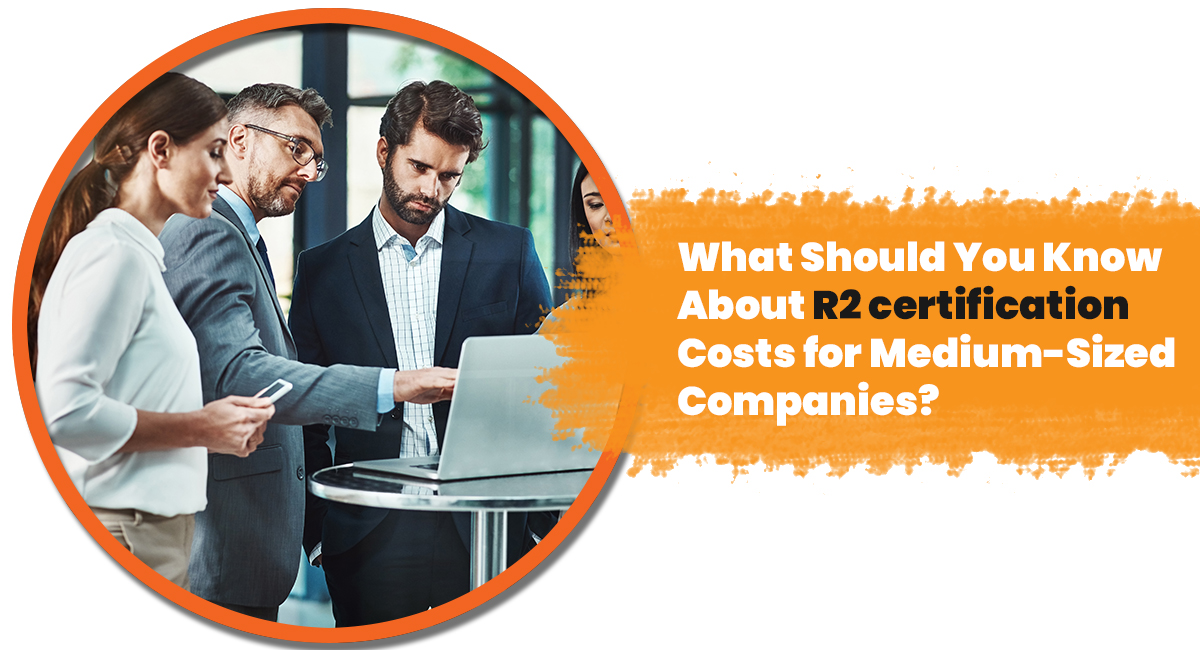What Should You Know About R2 certification Costs for Medium-Sized Companies?

Responsible recycling of electronic waste is turning into mandatory requirements for companies that utilize sustainable electronic recycling. Therefore, the R2 certification cost is a serious concern for most companies. The certification prices primarily depend on the size of the company and number of employees within an organization. However, many other things determine the overall cost of this accreditation. Before learning about certification costs, one must acknowledge the accreditation process. For an accurate implementation of the R2 framework and to implement it is necessary to identify the gaps between the current system and your expectations. According to their observations or conclusions deduced after a gap analysis, necessary actions will need to be taken for improvement. A gap analysis will identify the root causes behind these issues. Then action plans are to be made according to all identified issues.
The cost of this certification is based on their analyses. After a gap analysis, a major assessment within the internal audit, which verifies progress after each amendment. An internal audit charges the most as this is a critical evaluation of your system for compliance. Once an audit is completed, your management team will need to start implementing more actions to reduce non-conformities. Once these improvement sessions are completed, your systems will be registered after readiness reviews. This will increase the accreditation cost.
The following blog will talk about the cost in more detail. It will highlight the determining aspects of their pricing. It will also list the most pivotal aspects of processing the certification sessions.
What are the components for the R2 certification cost?
Certification Body Fees – Certification bodies charge for conducting on-site audits. The costs range from $5,000–$20,000, depending on the size of your company, the number of locations, and the complexity of processes. Also, if an auditor travels to your site, you may need to cover their expenses.
Consultation costs – Hiring a consultant can help you prepare for a certification audit by developing documentation, conducting internal audits, and training employees. The cost ranges from $5,000–$15,000, depending on the scope and level of support required.
Resource allocation cost – Time and effort from internal teams to prepare and implement the R2 requirements, such as: developing environmental, health, and safety (EHS) systems. Also, the cost depends on conducting the risk assessments and developing controls. Employee hours spent on R2 preparation, vary widely.
Costs for training – Employees may require training on R2 requirements, downstream due diligence, and handling electronic waste responsibly. It ranges from $1,000–$5,000 for group training sessions.
Cost for the system implementation – The first cost is for developing all documentation. It includes creating policies, procedures, and records for compliance. You may need to invest in software for tracking downstream materials and compliance. The price ranges from $1,000–$10,000.
Licensing cost – Certification bodies may charge administrative or registration fees to maintain your certification. These charges range from $500–$2,000 per year.
Annual maintenance cost – $5,000–$15,000 per year
What are the R2 certification requirements?
Implementing and maintaining an effective system based on recognized standards is the core requirement. It includes the processes to identify and mitigate risks, hazards, and environmental impacts. Your management team must prioritize reuse, repair, and refurbishment over recycling or disposal. They will also determine that the system complies with all applicable local, national, and international regulations, including environmental, occupational health, and data privacy laws. According to these requirements, your management team must establish policies and procedures for data sanitization or destruction under recognized standards. Manage Focus Materials (FMs) that pose significant environmental and health risks, such as Cathode Ray Tubes and Batteries.
What are the process requirements?
• Implement stringent data destruction processes for IT assets, with appropriate verification and documentation.
• Test, refurbish, and label equipment for reuse under R2 guidelines.
• Implement safe handling and processing for specialty items, such as batteries, CRTs, or hazardous components.
• Follow best practices for recovering valuable materials from electronics while minimizing waste and emissions.
• Establish systems for brokering electronics and ensure downstream compliance without direct handling of items.
• Regularly review and improve the R2 processes and management system.
• Conduct internal audits and address non-conformities.
Maintain documentation to demonstrate compliance, such as:
• EHSMS policies and procedures.
• Data sanitization logs.
• Downstream vendor agreements.
• Focus Materials tracking records.
Final words
To learn more about the R2 certification costs in the US, hire us for professional assistance. At Compliancehelp Consulting LLC, we have many services to help you conduct internal audits, gap analysis, and readiness reviews. Besides having a comprehensive set of guidance, you can customize a package according to your needs. Your overall cost might come down to an unbelievable amount after the R2 certification consultancy experts assess and evaluate the exact requirements.

